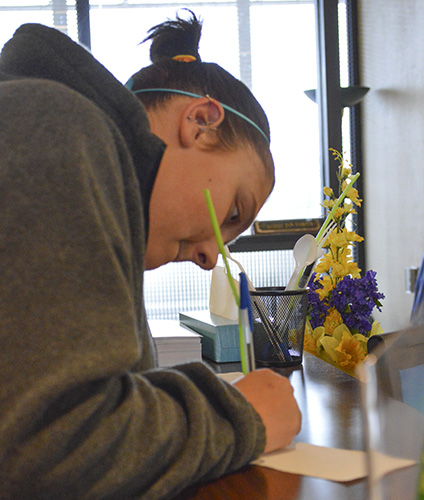
Maci Dungan, sophomore from Miamisburg, Ohio, fills out forms for financial aid.
Students are paying more for their higher education than the amount of money state funded universities are receiving, according to a government study released in 2014.
Jackie Dudley, vice president of Finance and Administrative Services, said students have not said much about the rise in tuition to anyone in the financial aid department.
President Bob Davies said the Education in General Fund, which pays salaries, electric bills and technology bills are also funded by students tuition.
Davies said education is an industry that operates at a higher cost increase than inflation.
“The reason for that is because we are very tied to the increase of technology,” Davies said. “Technology is most expensive right when it comes out, and we buy technology right when it comes out.”
Sara Pille, junior from Farmington, Ill., is trying to finish her degree and spend as little money as possible since her parents are paying for college.
“My parents are just really hoping I graduate, and can pay them back,” Pille said.
The Murray State Board of Regents sets the tuition rate after receiving budget estimates from the administration, which gets its information from the individual colleges.
Dudley said the institution has had two large budget reductions over the past two years and the University analyzed its operations to determine where it could cut costs.
“We share the burden and don’t want to pass on too much to the students,” Dudley said. “It is a difficult process to determine to raise tuition, and it’s the University’s choice.”
Brittany Dotson, senior from Levittown, Pa., doesn’t understand what a raise in tuition would pay for.
“The economy is getting better, food prices continue to go down, but higher education prices continue to go up,” she said. “I don’t get it. There aren’t any massive improvements being made on campus, so what are we
paying for?”
Not only does this affect students, but it also affects financial aid workers, because they are being over- worked.
There is a lot more money going into work-study funds, grants and loans to students than there is going directly to state schools, according to the study.
“Because of what students have garnered at the university level, they’re going to be more active in society, “ Davies said. “They’re going to be more likely to vote and more likely to be engaged in civic activities.”
Story by Brittany Risko, Staff writer

























































































